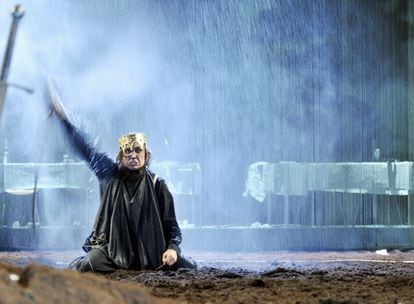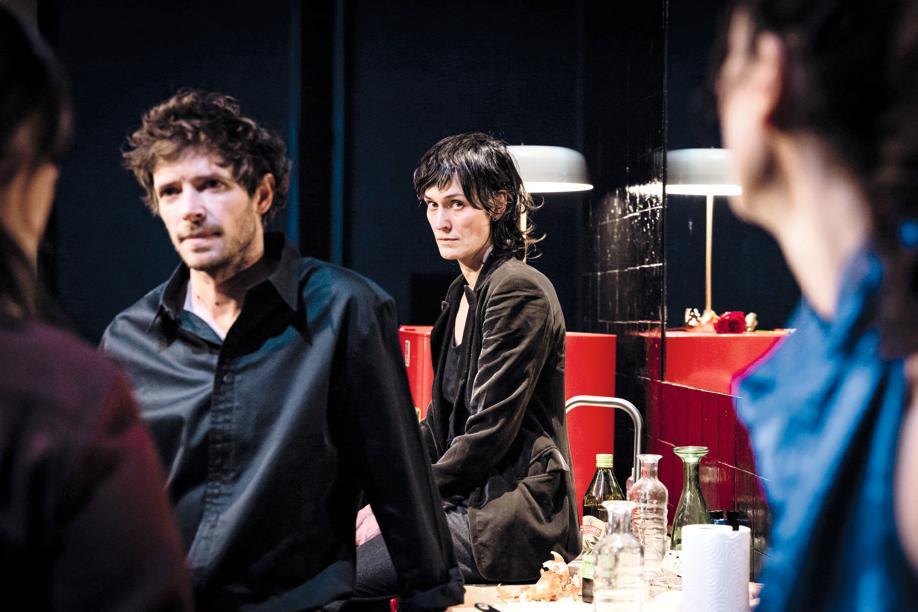Jordi Coca, a specialist in Shakespeare's theatre, photographed at his home. Consuelo Bautista (EL PAÍS)
Are we misreading Shakespeare and generally staging his theater in a way that is significantly different from the great author's intentions?
That is what the writer, doctor of performing arts, professor emeritus at the Institut del Teatre (IT) and theater director Jordi Coca (Barcelona, 74 years old) provocatively suggests in his monumental essay in Catalan
El teatre de Shakespeare
en el seu contexte
(Edicions de 1984/ IT, 2022), an 850-page book in which, in addition to offering a global rereading of the great Bardo, he reviews all his works one by one, pointing out the historical circumstances that we have to attend to in order to understand them well.
In the exciting and controversial journey, in which Coca, who disagrees with Harold Bloom, vindicates the almost forgotten Arnold Hauser (the author of the essential
Social History of Art and Literature,
in the three volumes of Guadarrama, 1976), there are issues such as the reality of Richard III, the virtuality of the Elizabethan stage, the million dead of the War of the Roses, the problem of a young boy playing Cleopatra, or that if we read carefully Hamlet was fat and out of breath, which would explain why he postponed his revenge so long.
More information
Where is Macbeth's soul?
The interview with Coca, conducted this week, has a surreal coda after seeing that Wikipedia considers the writer deceased on February 28, which basically puts us on the premises of the many Shakespearean stories of false deaths, ghosts and resurrections.
"I assure you that I am alive, as you could see," confirms the author sarcastically.
Ask.
He seems forced to start with the war.
There is a lot of war in Shakespeare.
Answer.
Yes, his way of treating her has a lot to do with her life in Tudor England -under Elizabeth I-, who invent a narrative as peacemakers of the country.
The War of the Roses, so present in Shakespeare's work, was something tremendous that caused a million deaths, in a population of just 4 million.
There was a lot of fear of a new civil war, the theme was still present and interested people, and Shakespeare only did what the public liked.
Q.
But heroic echoes can be heard in passages like Henry V's Saint Crispin's Day harangue at Agincourt, which has fueled both the military epic with its
happy few
, and its
band of brothers.
R.
Yes, in the war against France, but I think that basically what predominates is the fear of conflict and the idea that war is always the worst of the human condition.
And there is Falstaff as the incarnation of antimilitarism with his skepticism and his consideration that the job of soldiers is to fill the graves with their bodies.
It has been pointed out that Shakespeare also actually shows the decline of chivalry.
Q.
A recent Netflix movie, David Michôd's
The King,
with Timothee Chalamet as Harry/Henry V distorted Shakespeare's play to cast Falstaff as the hero of Agincourt!
R.
That has to do with my book.
I maintain that the works of Shakespeare have been loaded with adhesions, with neoclassical, romantic ideas and others that have nothing to do with the original but that have conditioned and condition our way of seeing his theater.
So what I propose is to go back to
time zero
of Shakespeare, and see how the context of each work conditioned it.
The context provided a reading that we have lost.
There were universal themes, philosophy, poetry, but also a reading closely linked to the events of the moment that we don't have now, and winks and understatements.
Shakespeare may not have seemed so lofty and cool, but he was very effective.
The exercise is to try to discern how those works were originally understood and made, what they could mean then, stripping them of the readings that have been accumulating about them.
It is a matter of tracing what those works on stage were really like in his time, before they were set in less than optimal conditions and with many adhesions.
Be careful, I'm not saying that it's mandatory to do Shakespeare in another way, freedom above all.
P.
You emphasize that it is essential to see Shakespeare's theater within the framework of a broad tradition.
R.
Those 36 or 37 works of his are only part of the 3,000 or 4,000 productions of the Elizabethan period that are estimated to have existed.
Romantic ideas of Shakespeare as absolute genius and totality have erased Marlowe, to whom Shakespeare owes the inner personification, and many others.
In the end it seems that there is only Shakespeare, Shakespeare and Shakespeare.
But he was only the culmination - a grand culmination, no doubt - of an age and a tradition without which he would not have existed.
Also from very specific circumstances, such as the enormous increase in theaters in London at the time and the enthusiasm for the theater that led to more being opened.
The Globe was filled with 2,000 spectators each day, in a population of 200,000 people.
There was a large and transversal hobby, ranging from the queen to the humble craftsman.
P.
You suggest that
Hamlet
, to cite one case, was adulterated, and that what we read today is not the original.
A.
In dimensions, for example.
We know that Elizabethan performances didn't last more than three hours and if you do
Hamlet
in its entirety it goes on for more than five.
The
Hamlet
that we read could not be represented in its time even if you did it in full chestnut.
P.
You are not very
Hamlet.
In that he agrees with TS Elliot.
R.
It does not seem to me the best work of Shakespeare either, and the way it has come to us has complicated things.
Not just because of the elongation.
The work is a true Frankenstein, made of diverse pieces and that walks with difficulties, unstable.
P.
You say that we imagine Hamlet badly, that prince that we see lean and fibrous, with a sharp character.
R.
In the second scene of the fifth act the queen says of him: “
He's fat, and scant of breath
”, he is fat and out of breath.
I think there is a key there.
Also, the actor we know who premiered the piece, Richard Burbage, was not skinny.
That thing about Hamlet not deciding, maybe it lacks background... If we cut a third of the text and put a fat guy who drowns we have another work.
Something similar happens with
Macbeth
.
We read it as a play about ambition, but I think in its time it was seen as a play about the legitimacy of power.
A fundamental issue when he had just come to the throne of England, as a peacemaker, a Scottish king, the first Stuart, James I, who by the way was a great specialist in the subject of witchcraft...
The actor Lars Eidinger, in Ostermeier's version of 'Hamlet'ARNO DECLAIR
P.
Thomas Ostermeier put a fat Hamlet in his production that was seen at the Lliure in 2008.
A.
Schaubühne's proposal was exceptional.
A brilliant exercise in dramaturgy.
It highlighted Hamlet's passivity and how he was seized by the madness that at first he only pretended.
Another great montage that I remember in the sense of what we are talking about is that of
Tito Andrónico
by Àlex Rigola: he was able to find the closest code to the original, using gore and Tarantino.
You have to remember that when you left the Globe it was usual to find an executed person publicly exposed in the streets of London.
Q.
And what about Richard III? What a great character!
A.
I'm not a big fan.
He provokes the same unhealthy fascination as Putin;
embodies the powerful evil, willing to do anything, and cynical.
But actually Richard III was a good king!
Shakespeare made him into a monster because he suited the dynastic discourse of the Tudors.
R.
Well, I won't say that he becomes nice, but he does arouse a certain complicity, although it may not be the best word.
R.
That is the product of Shakespeare's ability since
Henry V
to increase the psychological density of his characters, with which they show us an internal truth that was unusual until then.
Q.
Aren't you denying in some way with your study the grandiosity and irreducibility of Shakespeare?
R.
I would not spend so much time on Shakespeare to revile him.
Shakespeare didn't do anything different, but he did it better.
Shakespeare, like all his contemporaries, rewrote texts by others, dealt with topics that had already been addressed, recovered the classical tradition giving it another popular dimension, and figures and subjects from folklore.
He was an opportunist, a plagiarist.
He took from here and there, sniffing tastes in the air, chasing success with the public and constantly testing his theater on stage, changing on the fly what didn't work, dialogues, entire acts.
He was like the series writers of today.
I also like to compare him to Picasso, who takes what interests him and doesn't care if someone else has done it before, he gives it a new dimension.
Q.
You speak in the book about Elizabethan virtuality.
It is a very modern concept.
A.
Two characters in the empty scene evoked a crowded battlefield or a splendid garden with just their words.
The Elizabethan scene was very special.
There was a lot of noise, in the audience and on the stage with all the hatches that opened to remove dead bodies or enter ghosts.
The music disguised and the numbers of clowns and
fools
they distracted
It was something much less intellectual than that patina with which we have covered our concept of Shakespeare.
There was no emptiness, those moments of transcendent silence of some current productions, nor the scenographic bombast.
We have made a Shakespeare of great words and speeches.
Sartre already said that great words must be distrusted.
It is necessary to lower Shakespeare to the concrete facts, and understand that the context in which his works were written and performed is fundamental, very powerful...
P.
You remember that there was censorship.
The amount of reflections on politics and kings that Shakespeare releases is not bad.
R.
But he put them in the mouths of his characters, it was not him who said it.
Another clever way to get around censorship when works based on historical events in English history, which he had used so much, were banned was to set the plots in another era, ancient Rome, for example.
Now can't I talk about the Plantagenets, the Yorks, the Lancasters?
Well, since people also know Plutarch, I put Romans.
Julius Caesar
asks what will happen after a great leader, such as Elizabeth I.
Q.
Well, the queen did not like to talk about it, and doing so could cost you your head.
A.
Like Essex.
The public could not help but understand the similarities.
P.
By the way, you paint Isabel I in full bloom, who wore her clothes open and showed her breasts.
R.
Yes, he had a point of neglect in his last period.
And she was toothless and she hardly understood her.
P.
You reveal in the book a great admiration for another Roman,
Antonio and Cleopatra
.
R.
It has that political dimension of the study of power, but at the same time the protagonists are full of humanity, passion and grandiose desires.
P.
Shakespeare did it better than the others, he said.
A.
Much better.
But I insist, she did not invent anything.
A scene from 'Anthony and Cleopatra', directed by José Carlos Plaza.Pablo Lorente
P.
We find it hard to imagine that Cleopatra was played by a boy, a young actor.
R.
Yes, to Juliet, to other female characters, but to that great adult woman who is the Cleopatra of the play... In short, it was the custom of the time and people accepted the convention.
It would be exciting to see how it was done.
Q.
Could a single person create everything on the planet Shakespeare?
If it were just
Hamlet,
or
King Lear
, or
Macbeth
, or
The Tempest
…, but everything… Do you think there are other hands?
R.
_
For me it is the same, the one who leaves his town and arrives in London and begins to write and illuminates the works that we know and probably many more.
It is possible that he was part of a group, that they said let's do this or that, that they changed dialogues, scenes, but I think that essentially there is only one Shakespeare.





/cloudfront-eu-central-1.images.arcpublishing.com/prisa/SA64QHEFJFGB3OONE7GHYBUNBU.jpg)
/cloudfront-eu-central-1.images.arcpublishing.com/prisa/MW6LQDYDA5HZBBGASEP3XSI4CM.jpg)
/cloudfront-eu-central-1.images.arcpublishing.com/prisa/OOBF5MCTLJGB5J5O4SKHMULMK4.jpg)